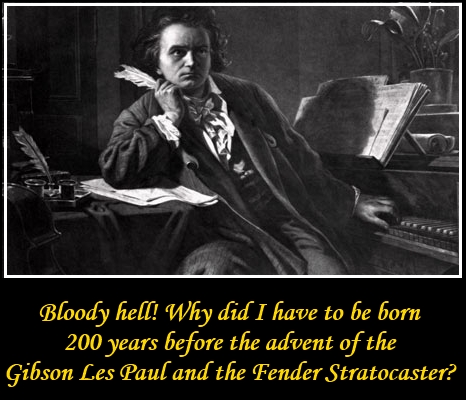For me, the big problem with a lot of emo and alternative music is the way it gets put together.
I'm of the 'old' school that says
the melody has to stand on its own without anything else or it's not really what you can call a song. It might well be a riff, or a soundscape, or a texture (Yay techno!) - but to me it's not a song because there isn't a beginning, middle, and end with something (i.e. a message or story) which gets developed, explored, and realized by the ending.
And a lot of the 'not-a-song' problem comes from people working out a chord progression or sequence and then squeezing a melody of sorts out of that rather than
writing the melody first, and then layering the accompaniment on top of it.
And because the so-called melody this "chords first" practice produces has been pushed out rather than composed, it often tends to be bland and somewhat boring.
Occasionally, you'll get lucky and strike gold doing the chords first. But it's largely hit or miss proposition. And not a good strategy for a songwriter that's in it for the long haul.
Most
one-hit-wonders are good examples of getting lucky with something they fell over rather than composed. But it's hard to keep getting that sort of luck over and over. It's panning for gold rather than scientifically prospecting and then systematically mining a lode or following a vein of precious metal.
Most successful songwriters are very meticulous about their craft even if they're self taught or do it almost subconsciously after a while. They usually start with a fairly good idea of where they want to go and work from there. Writing music is as much a craft as it is an art. And practicing songwriting yields major benefits there as well. Much like it does almost everything else when you think about it. Some people are afraid that if they analyze their process too much they'll hurt their "creativity." Without getting into a big argument about it (and there are other opinions about this) being afraid of having your inspiration or creativity dry up is the identifying mark of the amateur. Professionals, many of whom are true artists, know it's a false worry. Mastering craft and paying attention to it doesn't hurt art - it
liberates it by pushing all the mechanics to the background and providing you with a collection of tools to get things done. Once you have that, you soon discover your ideas flow constantly now that you're no longer struggling with the tools of your craft.
A music instructor I had said the acid test as to whether you've actually written a song is if you can sing it
a capella and can hear that it still works "without any frosting or garnishes."
I'd have to largely agree. He used to say: try doing it different ways. Does it work as a prog rock piece? How about a blues number. Does it work when you slow it down. Or speed it up? Could it be scored for an SATB choral group? A Mariachi Band? Would it sound good played on an accordion? How about an oboe? Or an acoustic guitar?
If the answer was yes to most of that, he'd smile and say: Well congratulations then. Looks like you just wrote yourself a song!
One interesting thing about that exercise was that your Muse often came up with another six ideas for
new songs while you were doing it.

Like my instructor used to say: Musical ideas are cheap. Musical ideas are easy to come up with. It's writing a decent song using those ideas that's hard. Or is until you do it enough that you finally learn how to stay out of your own way.
All my experience in music over the years has confirmed the truth of what he taught me.

Your own mileage may vary.


